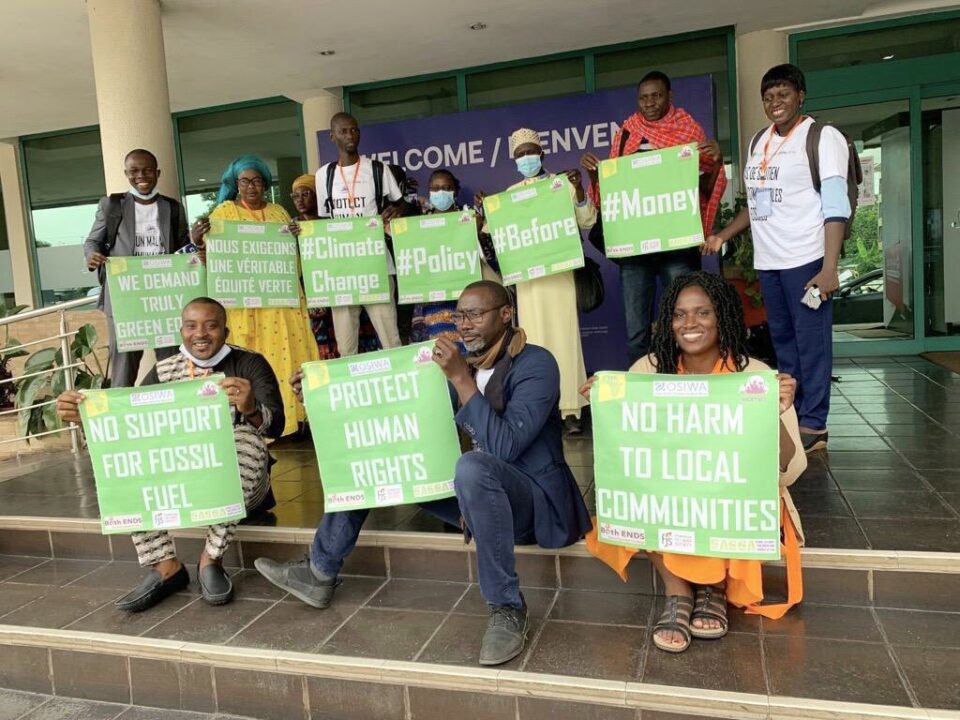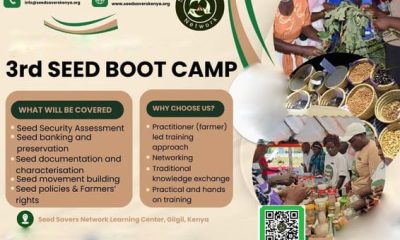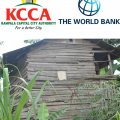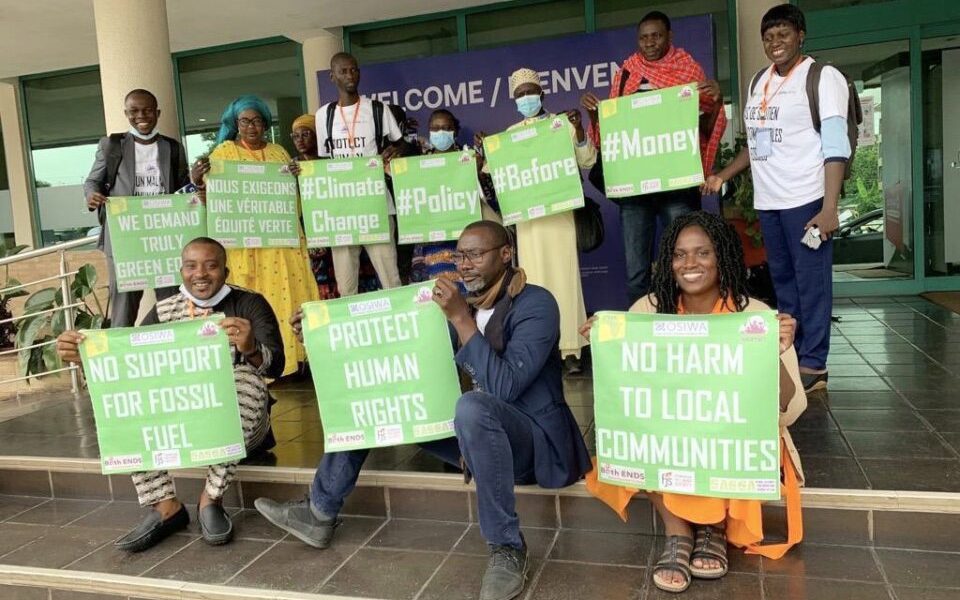Some of the activists staging a demo in Accra, Ghana
By Witness Radio Team
Witness Radio Uganda joins other civil society organizations across Africa and beyond to criticize the bank’s decision to exclude CSOs and communities from participating in the recently concluded African Development Bank (AfDB) 2022 annual meeting in Accra. The groups also called upon the bank to stop funding projects that exacerbate climate change and human rights violations. When member states signed an agreement on August 14, 1963, that consequently led to the establishment of the Bank, many touted it as one of the long-lasting solutions to African problems, however, that hope has dwindled.
The annual meetings held from the 23rd to 27th of May in Accra, Ghana presented an opportunity for the Bank to redeem itself from sustainable development mediocrity, and convince and commit to the world that it was willing to be metamorphosized from a sustainable development jester into a people-centered bank, instead, the AfDB opted to bury its head in the sand.
Key on its agenda; is the role the bank can play in the just energy transition and achieving climate resilience in Africa. However, communities most affected by climate change, and civil society groups supporting them were excluded. It was restricted to a clique of Governors, Senators, Bank Colleagues, investors, presidents, and other cherry-picked participants that were invited to discuss pressing issues affecting mankind.
As expected, the pertinent issues affecting the poor African communities, including those resulting from the adverse impacts of projects financed by AfDB, that is, the disintegration of families, lost livelihoods, and the continued affront to dignity was sacrificed at the altar of painting a Rosy picture about the Banks “gains and projections.”
In Uganda, the downtrodden have paid the biggest price for AfDB’s irresponsible banking. The Paten clan in the Pakwach district has experienced and continues to experience gross human rights violations arising from the Wadelai irrigation scheme implementation funded by the AfDB.
According to the communities, the project forcefully acquired more land for the Wadelai Irrigation Scheme project under The Farm Income Enhancement and Forestry Conservation Project-Phase 2 (FIEFOC-2). This was contrary to the earlier understanding with the community that the project would utilize 365 acres which the community had freely offered for the project. Instead, 365 hectares were forcefully acquired.
Information obtained from the Coalition for Development’s website and published on August 10, 2021, indicates, that sixteen members of the Paten Clan, a community in Pakwach District in northern Uganda, were shot at and wounded by local police and army officers for opposing the Wadelai irrigation project implementation.
“…Staff of the construction company in charge of implementing the project, together with representatives of the local authorities and the police, forcefully entered the community. When communities questioned and protested against the trespass, the local police and members of the Uganda People’s Defence Force (UPDF) started firing bullets and teargas to disperse them. 16 community members were injured.
After the shooting, the police refused to hand them the forms for documenting the injuries suffered, meaning they were unable to easily access healthcare in government health centers. The day after, UPDF officers arrested and beat up four women, including one pregnant woman, while they were on their way to fetch water…, according to victims.
A community in Kiyindi, Buikwe district was also evicted by the African Development Bank’s water project that allegedly aimed at benefiting them and given little compensation in 2020.
The area Councilor, Mr. Amir Kiggundu says the community now grapples with cases of hunger and poverty. “The government said we would benefit a lot if we accepted the project but people were paid as little as 2 million Uganda Shillings (Approximately 540 US Dollars) for their land. This was little money that could not afford to relocate them and buy the land elsewhere in Uganda. As a result, these people are now renting and work hand to mouth. Their children have since dropped out of school” the area Councilor said in an interview with Witness Radio.
Listed as one of the Development Bank’s principles, it has fallen short of inclusivity and participation of all stakeholders during the review process of the bank’s policies.
“Transparency and participation are among the greatest shortcomings in AfDB’s governance, and the 2022 Annual Meetings, unfortunately, demonstrate the failure to prioritize engagement with civil society and communities. We are so concerned that there is no space for civil society in the official program.” Aly Marie Sagne, Founder and Executive Director, Lumìere Synergie pour le Développement, Sénégal said.
Apart from including climate change, food security, and energy development on its agenda list, the Bank was equivocal on these issues. The speeches delivered by Dr. Akinwumi Adesina , the bank’s President and the ilk were carefully scripted and choreographed to paint a wrong picture, transparency as a key driver of sustainable development was not mentioned.
On food security, Dr. Akinwumi Adesina said there is no need for Africans begging food and that the bank has approved the $1.5 billion plan that will be used to support African countries to produce food rapidly to ensure sustained supply producing 38 million metric tons of food, including wheat, maize, rice, and soybeans.
About the increased climate crisis, Adesina said Africa suffers $7-15 billion per year in losses to climate change, and losses are projected to rise to $40 billion per year by 2030. “Africa has no choice but to adapt to climate change but African Development Bank has doubled its financing for the climate to $25 billion by 2025,” he said.
The Bank is also implementing the $20 billion Desert to Power initiative in the Sahel, to build 10,000 megawatts of solar power generation. This will provide electricity via solar for 250 million people and turn the Sahel into the largest solar zone in the world.
Whereas all these strategies mentioned are meant to uplift the project beneficiaries, there is no guarantee to ensure the realization of their commitments.
Witness Radio’s Executive director, Mr. Wokulira Ssebaggala added his voice to the 30 participants in 11 countries that held a separate meeting in Accra from 23-25 May to allude to his concerns over the absence of the project beneficiaries excluding their views in critical issues.
“Many development projects have proven harmful including those funded by this Bank. They have had issues with human rights violations and propelled many into excess poverty and hunger. Because the local people are the beneficiaries, their interests should be represented”. He spoke.
The AfDB funds hundreds of projects across the continent and it is one of the key economic players in Africa. Through its direct and indirect financing, it supports projects and policies across a wide range of sectors. However, in practice, the Bank is not different from the loan sharks operating in the streets of Kampala.
“Although the AfDB is supposed to serve the interests of African people, it lags behind its peer institutions in terms of transparent and participatory policies and implementation, and it is very difficult for civil society, local communities, indigenous Peoples, and all rights holders to hold the Bank accountable at all stages of its operations,” a statement from members of the #Dev4Africa campaign read.
This approach to development has led to negative impacts on communities from AfDB projects, including human rights, labor, and environmental violations. Additionally, it has led to contradictory approaches to challenges like the climate crisis, whereby the AfDB is supporting needed adaptation and mitigation projects on the one hand, and funding climate-harmful fossil fuel projects on the other hand.
“We don’t understand why the AfDB put such a risky project in our community.” Fatou Samba is a representative of a community whose livelihoods and environment have been affected by the AfDB-financed Sendou coal power project in Senegal said.


 MEDIA FOR CHANGE NETWORK2 weeks ago
MEDIA FOR CHANGE NETWORK2 weeks ago
 MEDIA FOR CHANGE NETWORK1 week ago
MEDIA FOR CHANGE NETWORK1 week ago
 SPECIAL REPORTS AND PROJECTS1 week ago
SPECIAL REPORTS AND PROJECTS1 week ago
 MEDIA FOR CHANGE NETWORK1 week ago
MEDIA FOR CHANGE NETWORK1 week ago
 SPECIAL REPORTS AND PROJECTS1 week ago
SPECIAL REPORTS AND PROJECTS1 week ago
 MEDIA FOR CHANGE NETWORK2 days ago
MEDIA FOR CHANGE NETWORK2 days ago
 NGO WORK1 day ago
NGO WORK1 day ago
 MEDIA FOR CHANGE NETWORK38 minutes ago
MEDIA FOR CHANGE NETWORK38 minutes ago



























